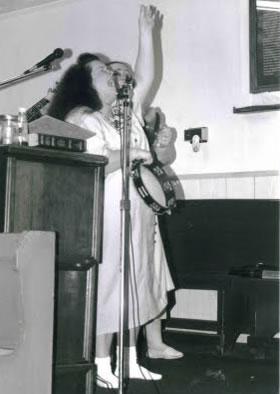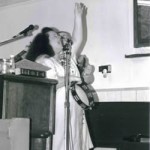Emotionalism vs. True Worship
 I will preface this article by letting it be known that the intentions of my articles is never to point fingers and criticize, but rather to bring light to an issue (or issues), as well as to help bring about reflection, enlightenment and, prayerfully, positive change. That being said, I’ve noticed a trend during the praise and worship portion of service at different churches that I’ve visited, and even ones where I’ve been a member (To be sure, our worship should extend well beyond a church service).
I will preface this article by letting it be known that the intentions of my articles is never to point fingers and criticize, but rather to bring light to an issue (or issues), as well as to help bring about reflection, enlightenment and, prayerfully, positive change. That being said, I’ve noticed a trend during the praise and worship portion of service at different churches that I’ve visited, and even ones where I’ve been a member (To be sure, our worship should extend well beyond a church service).
In John 4:23, 24, Jesus tells the Samaritan woman at the well that we must worship God “in spirit and in truth”. When it’s time for the praise and worship part of service there seems to be too many of us that don’t seem to understand exactly what ‘in spirit and in truth’ really means. There are some people who respond only when a certain song is being played, some who spend most of their time clapping or reacting uncontrollably and looking around to see what others are doing (or if anyone is looking at them). Things are exacerbated even more so when you have the worship “leader” who wants to be the ‘next big thing’, more concerned with how great he/she sounds, and how many people they can get to roll around in the aisles, or respond in some other emotionalistic manner.
What is emotionalism?
Emotionalism, in the church, is a reaction that is based on a human sentiment or feeling. It is devoid of true worship and holds no real sustaining substance. In the course of this article it is important to note that there is stark differentiation in ‘emotionalism’ versus emotions that stem from true worship.
How many of us, before we were saved of course, would go to the night club to hang out. We would mingle with our friends and people watch, but when that certain song came on, we all ran to the dance floor. That song was the joint! We were full of unbridled emotion, jamming to the beat. When the song went off, we were back to mingling and people watching, and by the end of the night could hardly even remember that experience when the song was played. Now fast forward to our present-day ‘saved, sanctified, and filled with the Holy Ghost’ lives.
We hear one of our favorite Christian songs that have just the right beat or melody, and we react. Some react by clapping wildly, dancing, and falling out in the aisles during upbeat songs. While, when a slower song with a nice melody is played, some might react by crying and/or hugging someone. The reactions might vary widely, but all fall under the category of emotionalism when not done ‘in spirit and in truth’. After the service is over, we go about our lives no different than before, but momentarily relishing that feel-good moment that we had.
The emotionalistic characteristics from the reactions at the night club and at the church are no different, aside from the fact that now, presumably, you are saved.
What is true worship?
At this juncture would be a great opportunity to point out that emotion in worship is a great thing. During praise and worship we should experience many different feelings: awe, contriteness, conviction, gratefulness, joy, love, peace, etc. But the stark difference from emotionalism is that these feelings should come from true worship to God and not just an on-the-surface reaction to a stimulus other than God.
True worship is emotion and reverence to God derived from knowledge of Him, and relationship with Him. It is a deeply emotional connection with God that is developed through sound doctrinal training, study of His Word, and a genuine walk with Him. In true worship our emotion is a direct response to our cognitive (intellectually aware) acknowledgment of God and gratefulness for His works in us and in all the earth. When we are at the place of true worship we are not reacting to the beat and rhythm of the music… but rather we are reacting to the rhythm and beat of God’s very heart.
When I think of true worship I think of David, perhaps the greatest worshipper of God in the Bible. As I read through the Psalms, David’s desire and passion for God pours out of the pages. As true worshippers we are to have that same zeal and desire for God. We must be like the “deer that panteth for the water” (Psalm 42:1)…longing for God…to please, glorify, and serve Him!
How do I become a true worhipper?
We become true worshippers by learning of God. By absorbing ourselves into His Holy Word. There is so much richness in the Bible, and as we read and digest the Word we began to develop a heart that seeks to honor and please God. We learn how we are to live on a daily basis, and how to deal with the various situations that confronts us.
Not only are we to be hearers of the Word, but more importantly, we are to be doers of the Word (James 1:22-24). Being doers of the Word means treating others with love. It means having a healthy prayer life and constantly seeking to do more for God, to be nearer to Him, and to live a life that is Christ-centered.
When we reach the place of true worship we encounter the very presence of God, and He hears our hearts. In that moment He breathes on us… and into us…refreshing us…loving us…revealing to us…strengthening us. In this realm the experience of worship is sustaining, edifying, and truly life-defining.
The goal of ‘praise & worship leaders’ should not be to impress the congregation with vocal and musical prowess. Rather, the only goal and purpose should be to send up a sweet savory praise that is pleasing to the nostrils of God…ushering in His very presence. True worship opens up the door for the divine to happen. Chains are broken, bodies are healed, people are delivered, and souls are saved in this atmosphere.
In summary, emotionalism is worship WITHOUT worship to God. Whereas, true worship is liberating and pleasing to God. The Bible tells us that He inhabits our praise (Psalm 22:3). Let us glorify God and seek to be true worshippers. When this happens I promise you that your life will never be the same!
Category: Articles, Articles Of Interest













Thank you for that clarification…it really makes sense in what I have been experiencing and that is why I left one church. It was just too much for me.
I KNOW THATS RIGHT STEPHANIE!!!! WAYYYY TOOOO EMOTIONAL!!!!
Don’t be silly. David would be kicked out of most churched today for dancing in his underwear.
I think God is much more concerned with his children hurting one another and sinning than someone being to radical and emotional in worship.
If you don’t like charismatics… Fine. But kindly remember the enemy is the accuser of the brethren, not people who are pursuing Jesus and cry or shake or laugh in the process.
David danced naked . Should we dance naked in church ? Old testament worship is not in spirit and truth , as one must be born-again for one to be a true worshipper . True worship is a Godly relationship , not outward of the flesh in the mechanical way of the old testament .
Scott I agree with you. Amen to that brother! We have to stop judging our brothers and sisters in Christ and trying to put them “inside the box”… David was radical and had no shame when he worshipped God! If a certain church does not “conform” with certain people’s standards just move to one that fits the criteria, after all we go to church to worship God and not to check if people are doing what we think is “holly” by our standards. God bless!
I very much agree with the observations made in this article. However Emotionalism in not at all limited to contemporary worship songs. For the past two years I have been at a small church that is primarily made up of people who are older than 50. What I have encountered among quite a few of those people is an incredible emotional attachment to certain hymns, and a refusal to “worship” to anything else. This problem has become much more clear as the church has been holding a “revival”, and everything about this revival is clearly designed to play on peoples emotions. And what is absolutely astonishing to me is that the people love it. I am certain it is not the truth of scripture that they are responding to, because there is almost no scripture or truth being presented. Instead the evangelist tells emotionally charged stories until he gets a reaction out of them. It is incredibly dangerous.
My point in all of this is that Emotionalism is dangerous, no matter what genre of music or denomination you are in.
Thank you for this sermon. This is proof of scripture “ask and it shall be given.. “. What a journey God has given me called ‘life’. I’m a bit disturbed how church (especially charismatic, in which I was raised) has veered away from a life dedicated to prayer. I have seen the effects/results of devoting ones self to fasting and prayer. Demons know you the moment that you walk into a room. God has also proven to me that there is no better protection than God’s love, grace and mercy. What I find missing with worship these days is the lack of prayer behind the worship experience. The prayer that goes forth is somewhat like the pre-meal blessing prayed as children,”Jesus wept” and everyone starts grabbing the food. Where are the revivals where one could visit and be refreshed, without needing to acknowledged as being “Mr/Ms. So and so?” I won’t say that the people of my childhood were more holy than what I see now. What I will say is the lack of prayer has led to ‘gospel artists’ instead of gospel singers. Admittedly there are many distractions in today’s world. There were 7 tv channels when I grew up. Now one can buy over 500 channels. Who has time to watch that much tv? Add satellite radio and God gets less time in a week. What does worship mean these days when church service has been reduced to the same 5 people running the aisles, programmed to get others to respond emotionally. Musicians that have no interest in God being allowed to play in Gods house without being checked for their “fruit”. What the Jewish temple has shown and taught is that for the priests to work in the temple, their lives were set apart for service. To play in church now only requires the ability to play a jazz riff or click. It all starts with fasting and prayer, which is the power of the spoken word.
I was first saved in a Charismatic church which was a wonderful start to learning to be passionate for God. I learn to dance freely during worship pouring myself out to God. However after awhile I realize worship became void of God. I could not hear or see or experience Him. This article help me see that I went from worship to emotionalism worship. I am only reacting to the beat of the music. It doesn’t matter the church you go to learning to truly worship Him is what is important but not many people teach how to be a worshipper. Thank you for this insightful read that has open my eyes to worship.